
Gorteria
Scope & Guideline
Elevating Understanding of Plant Life
Introduction
Aims and Scopes
- Taxonomy and Nomenclature:
The journal emphasizes the classification and naming of plant species, particularly focusing on the genus Rubus and other significant taxa within the local flora. - Morphological Studies:
Research on the physical characteristics of plants, such as leaf shape and flower structure, is a consistent theme, aiding in species identification and understanding ecological adaptations. - Ecological Insights:
Gorteria publishes studies that explore ecological interactions among plant species and their environments, including discussions on rewilding and restoration ecology. - Georeferencing and Specimen Collection:
The journal utilizes modern methodologies such as automation and crowdsourcing to georeference herbarium specimens, enhancing the accessibility and usability of botanical collections. - Regional Flora Studies:
A core focus on the flora of the Netherlands, with papers detailing newly identified species and updates to existing taxonomic classifications.
Trending and Emerging
- Automation and Crowdsourcing in Botany:
The use of automation and crowdsourcing for georeferencing specimens highlights an emerging trend towards integrating technology with botanical research, improving data collection and accessibility. - Focus on New Species Descriptions:
There is a noticeable increase in the publication of new species descriptions, especially within the Rosaceae family, indicating a vibrant interest in documenting biodiversity. - Ecological Restoration and Rewilding:
Recent studies emphasize ecological restoration efforts, reflecting a growing concern for biodiversity conservation and the restoration of native habitats in the Netherlands. - Morphological Research Advances:
Increasing interest in detailed morphological research indicates a trend towards utilizing morphological characteristics for taxonomic clarity and ecological understanding.
Declining or Waning
- General Flora Studies:
Broader studies on plant ecology and flora that do not focus on specific taxa are becoming less common, possibly as the journal narrows its scope to more detailed and targeted research. - Historical Flora Analysis:
Papers that delve into historical accounts or analyses of flora are less frequent, suggesting a shift towards contemporary species studies and immediate ecological concerns. - Non-native Species Research:
While still relevant, the investigation of non-native or invasive species appears to be receiving less emphasis compared to the exploration of native species and their ecological roles.
Similar Journals

BRITTONIA
Championing Ecological Understanding in Plant StudiesBRITTONIA, published by Springer, stands as a reputable journal dedicated to advancing the fields of botany and plant sciences. With a storied history dating back to 1931, this journal has evolved to embrace contemporary research spanning various aspects of plant biology, ecology, and systematics. Focusing on a comprehensive analysis of both ecological interactions and plant systematics, BRITTONIA plays a crucial role in disseminating knowledge among researchers and professionals committed to understanding plant life and its environmental contexts. Despite its open access status being currently unavailable, the journal ensures wide accessibility through institutional subscriptions. In the latest rankings, it proudly holds a Q2 category in Plant Science and a Q3 category in Ecology, Evolution, Behavior, and Systematics, indicating its growing influence and academic rigor. Researchers and students alike will find BRITTONIA an essential resource for the latest findings and discussions in plant sciences.

Bangladesh Journal of Plant Taxonomy
Fostering knowledge, preserving biodiversity.Welcome to the Bangladesh Journal of Plant Taxonomy, a leading open-access publication dedicated to advancing the understanding of plant taxonomy in the context of Bangladesh's rich biodiversity. Published by the Bangladesh Association of Plant Taxonomists, this journal plays a crucial role in fostering academic discourse and dissemination of research findings since its establishment. With its ISSN 1028-2092 and E-ISSN 2224-7297, the journal provides a platform for researchers, professionals, and students to share their contributions to plant science. Although it has discontinued its coverage in Scopus from 2018, it remains a valuable resource, evidenced by its rankings in the agricultural and biological sciences categories, including a placement of #330/403 in Plant Science and #515/588 in Ecology, Evolution, Behavior, and Systematics. Open access since 2005, the journal ensures that critical research is freely available to all, supporting the global community in the study and preservation of plant biodiversity.
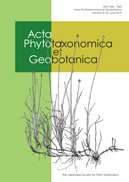
Acta Phytotaxonomica et Geobotanica
Exploring the Interconnections of Flora and EnvironmentActa Phytotaxonomica et Geobotanica, published by the Japanese Society for Plant Systematics at the University of Tokyo, serves as a vital platform for advancing research in the fields of ecology, plant science, and biodiversity. With an ISSN of 1346-7565 and an E-ISSN of 2189-7042, this journal not only provides a comprehensive evaluation of current topics within these categories but also addresses the intricate connections between plant systems and their ecological environments. Although currently not open access, the journal is essential for researchers aiming to publish cutting-edge findings, contributing significantly to its classification within the Q3 quartile across multiple disciplines, including Ecology and Plant Science. With an ambitious focus on enhancing the understanding of plant taxonomy and geography through a convergence of research periods from 2014 to 2024, Acta Phytotaxonomica et Geobotanica plays a pivotal role in fostering academic discourse and innovation in plant systematics. Its geographical foundation in Japan enriches the journal's unique perspective on regional flora, making it an indispensable resource for students, researchers, and professionals in the field.
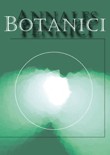
ANNALES BOTANICI FENNICI
Exploring the Depths of Ecology and Plant ScienceANNALES BOTANICI FENNICI, published by the Finnish Zoological Botanical Publishing Board, is a distinguished journal that has served as a vital platform for advancing research in the fields of Ecology and Plant Science since its inception. With an ISSN of 0003-3847 and an E-ISSN of 1797-2442, this journal has established a reputation as a Q3 category publication in both Ecology, Evolution, Behavior and Systematics, and Plant Science as of 2023. Although it presently does not offer open access options, the journal remains a cornerstone in the dissemination of important research findings and methodologies pertinent to these scientific domains. By promoting high-quality research, ANNALES BOTANICI FENNICI not only contributes to scholarly discourse but also enriches the academic community in Finland and beyond. Researchers, professionals, and students are encouraged to explore its archives, engaging with a wealth of knowledge that spans over four decades, from 1973 to 2023, thereby enhancing their understanding and furthering their studies in botany and ecology.
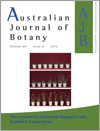
AUSTRALIAN JOURNAL OF BOTANY
Unveiling ecological interactions through rigorous research.The Australian Journal of Botany is a prestigious peer-reviewed journal published by CSIRO PUBLISHING, dedicated to advancing the field of plant sciences and ecology. Established in 1953, this journal provides a critical platform for researchers to share original research findings, reviews, and perspectives in subjects ranging from plant biology to ecological interactions, with a focus on Australian flora and its conservation. With an impressive impact factor and categorized in the Q3 quartile in both Ecology, Evolution, Behavior and Systematics and Plant Science, the journal ranks competitively within its fields, allowing authors to reach a diverse audience of professionals, students, and fellow researchers. The journal is accessible in print and electronically through its ISSN: 0067-1924 and E-ISSN: 1444-9862, providing wider access to vital research outcomes that influence environmental policies and natural resource management. As it aspires towards innovation and excellence, the Australian Journal of Botany remains an essential resource for those passionate about the richness of plant biodiversity and ecological understanding.

Annali di Botanica
Connecting researchers to the world of botany.Annali di Botanica is a distinguished journal published by UNIV STUDI ROMA LA SAPIENZA that has become a vital platform for advancing research in the field of plant sciences. With its Open Access policy established since 1995, it ensures that a wide audience including researchers, professionals, and students can access high-quality, peer-reviewed articles that contribute to the global body of botanical knowledge. As of 2023, the journal holds a Q3 rank in the Plant Science category, reflecting its commitment to scholarly excellence and relevance, as evidenced by its position within the 62nd percentile of activities ranked in Scopus. The journal encompasses diverse topics in botany, fostering discussions that encompass morphological, ecological, and genetic aspects of plants, effectively bridging theoretical knowledge and practical applications. Situated in the heart of Rome, Italy, at PIAZZALE ALDO MORO, 5, the journal not only addresses regional botanical issues but aims to serve a global audience, enhancing collaborative efforts and stimulating innovation across the botanical sciences.

Alpine Botany
Connecting Ideas in Alpine Ecology and Botany.Alpine Botany is a premier scholarly journal published by SPRINGER BASEL AG, dedicated to the field of ecological and botanical research with a specific focus on alpine environments. With an ISSN of 1664-2201 and an E-ISSN of 1664-221X, this journal has established itself as a significant platform for disseminating high-quality research findings, with its latest category rankings placing it in the Q1 quartile for both Ecology, Evolution, Behavior and Systematics as well as Plant Science. Originating from Switzerland, Alpine Botany benefits from its geographical context, fostering a rich exchange of ideas and research advancements relevant to high-altitude flora. The journal operates under an Open Access model, promoting widespread accessibility of its content while accommodating an increasing demand for interdisciplinary studies within the ecological and botanical communities. With a commitment to excellence, Alpine Botany continues to serve as an invaluable resource for researchers, professionals, and students who are keen to explore and understand the complexities of alpine ecosystems.

Mediterranean Botany
Advancing Knowledge in Plant Science and EcologyMediterranean Botany is a distinguished peer-reviewed journal dedicated to the flourishing fields of Ecology, Plant Science, and Ecology, Evolution, Behavior and Systematics. Published by the Universidad Complutense de Madrid, Servicio Publicaciones, this Open Access journal has been disseminating valuable research since 2018, ensuring that findings are accessible to a global audience, with an emphasis on Mediterranean vegetation and biodiversity. With an ISSN of 2603-9109, it contributes significantly to the academic discourse in its category quartiles, recently featuring in Q3 for Ecology and related fields. Notably, Mediterranean Botany ranks within the top half of its category in Scopus, highlighting its relevance and contribution to the scientific community. Researchers, professionals, and students alike will find the journal to be a vital resource for latest discoveries, trends, and conservation strategies in Mediterranean ecosystems, positioning it as an essential platform for advancing knowledge and fostering collaboration within the plant sciences.
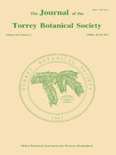
JOURNAL OF THE TORREY BOTANICAL SOCIETY
Connecting scholars to cultivate a deeper understanding of plants.JOURNAL OF THE TORREY BOTANICAL SOCIETY is a prominent academic journal dedicated to advancing the fields of botany and ecology, published by the esteemed TORREY BOTANICAL SOCIETY. With an ISSN of 1095-5674 and an E-ISSN of 1940-0616, this journal serves as a critical platform for researchers, professionals, and students to share their findings and insights. Despite its status in the Q4 category for the 2023 rankings across Ecology, Plant Science, and Ecology, Evolution, Behavior and Systematics, the journal continues to foster significant discourse and collaboration in the botanical sciences, aiming to elevate the understanding of plant biology and ecosystems. Its open access options enhance accessibility, ensuring that groundbreaking research reaches a wider audience. Published in the United States, the journal features work from both established scientists and emerging scholars, making it a vital resource for anyone involved in the study of plants and their environmental interactions. Explore the JOURNAL OF THE TORREY BOTANICAL SOCIETY to engage with cutting-edge research and contribute to the ongoing dialogue in the botanical sciences.
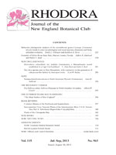
RHODORA
Exploring the Depths of Plant ScienceRHODORA, published by the New England Botanical Club Inc, is a prominent journal dedicated to the field of botany, specifically focusing on Horticulture and Plant Science. With a rich history dating back to its founding years and ongoing publication from 1995 to 2024, this journal serves as a vital platform for disseminating research, reviews, and advancements in botanical studies. Though classified in the Q4 quartile for both horticulture and plant science in 2023, RHODORA remains an essential resource for researchers and practitioners, providing insights into plant ecology, conservation, and cultivation practices. While it does not offer Open Access options, the journal's commitment to quality research in a highly specialized field makes it a significant contributor to the botanical sciences, fostering collaboration and innovation among scholars and professionals in the United States and beyond.